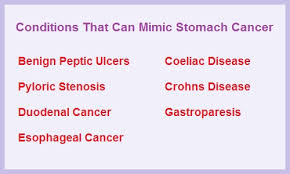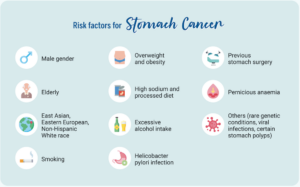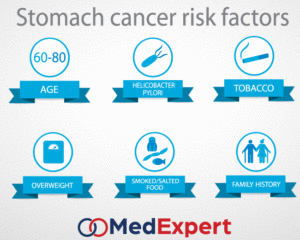RISK FACTORS FOR STOMACH CANCER:
GENERAL
- Age: Stomach cancer is found most often in people over age 55.
- Gender: The disease affects men twice as often as women.
- Race: Stomach cancer is more common in African Americans than in Caucasians.
- Region: This type of cancer is more common in some parts of the world, such as Japan, Korea, parts of Eastern Europe and Latin America. People in these areas eat many foods that are preserved by drying, smoking, salting or pickling.
BODY
- Obesity: Obesity has been linked to an increased risk of stomach cancer
GENETICS
Certain gene mutations and some inherited conditions are considered stomach cancer risk factors. They include:
- BRCA1 & BRCA2: Inherited mutations on the BRCA1 and BRCA2 genes are often associated with higher risks for breast cancer. Individuals who have inherited these genetic mutations are also at an increased risk for stomach cancer
- E-cadherin/CDH1: Though rare, people who inherit this genetic mutation have a 70 to 80 percent chance of developing stomach cancer in their lifetime. Also, women with this genetic defect have an increased risk of breast cancer.
- Lynch syndrome: This condition may also be referred to as hereditary non-polyposis colorectal cancer (HNPCC), a genetic condition that runs in families. More commonly, this condition is associated with an increased risk for colon cancer. HNPCC also predisposes people to stomach cancers.
- Familial adenomatous polyposis (FAP): This syndrome causes polyps in the colon, stomach and intestines. Often caused by mutations of the gene APC, this syndrome greatly increases a person’s risk of colorectal cancer and may play a small role in increasing a person’s stomach cancer risk.
LIFESTYLE
- Smoking: There is evidence linking cigarette smoking to many types of cancer, including stomach cancer. Smokers have been found to be at greater risk of developing cancer than non-smokers.
- Diet: Scientists believe that eating foods preserved in these ways may play a role in the development of stomach cancer. On the other hand, fresh foods (especially fresh fruits and vegetables and properly frozen or refrigerated fresh foods) may protect against this disease.
- Working in the coal, metal or rubber industries: Chemicals that are released in these environments have been linked to the development of stomach cancer.
OTHER CONDITIONS
- H. pylori infection: Doctors have found that a long-term H. pylori infection may lead to inflammation and pre-cancerous changes to the stomach lining. In fact, stomach cancer patients typically have a higher incidence of H. pylori infections than people who do not have stomach cancer.
- Pernicious anemia: Some people with pernicious anemia may have gastric polyps, which can increase the risk of stomach cancer.
- Epstein-Barr virus infection: According to the American Cancer Society, Epstein-Barr virus is found in the cancer cells of about 5% to 10% of people with stomach cancer.
ENVIRONMENTAL AND OCCUPATIONAL EXPOSURES
The risk of stomach cancer is increased in people who
-
work in the rubber or coal industry
-
have been exposed to very high levels of radiation
Those at risk for Stomach Cancer:
People at elevated risk for gastric cancer include older adults with atrophic gastritis or pernicious anemia; patients with sporadic gastric adenomas, familial adenomatous polyposis, or hereditary nonpolyposis colon cancer; and immigrant ethnic populations from countries with high rates of gastric carcinoma. Workers in the rubber and coal industries are also at increased risk.
There is consistent evidence that Helicobacter pylori infection, also known as H. pylori infection, of the stomach is strongly associated with both the initiation and promotion of carcinoma of the gastric body and antrum and of gastric lymphoma.
There is consistent and solid evidence that Epstein-Barr virus (EBV) infection is strongly associated with gastric cancer.
Compared with the general population, people with duodenal ulcer disease may have a lower risk of gastric cancer.
Risk factors for gastric cancer include the presence of precursor conditions such as chronic atrophic gastritis and intestinal metaplasia, pernicious anemia, and gastric adenomatous polyps. Risk factors could include type A blood type. Environmental factors include low consumption of fruits and vegetables; consumption of salted, smoked, or poorly preserved foods; cigarette smoking; and radiation exposure.
Those at great increased risk for stomach cancer:
Hereditary diffuse gastric cancer (HDGC) is a rare inherited condition in which people have a greatly increased risk of stomach cancer, which often develops at a fairly early age. This rare syndrome is most often caused by an inherited mutation in the CDH1 gene.
It’s very important to recognize people and families with this inherited syndrome, because most people who have it will develop stomach cancer. Families with HDGC typically have two or more close relatives who develop stomach cancer (usually the diffuse type), and/or at least one person who is diagnosed before age 50. Some family members might also develop invasive lobular breast cancer.
Doctors often refer people who might have HDGC to a genetics professional, so they can discuss possibly getting genetic testing. If testing is done and shows a person has a mutation (abnormal change) in the CDH1 gene, doctors often recommend they consider having their stomach removed (typically between the ages of 20 and 30) before cancer develops. However, this operation (called a total gastrectomy) can lead to long-term changes in the way a person eats.
Some other hereditary cancer syndromes are also linked with an increased risk for stomach cancer, including Lynch syndrome, familial adenomatous polyposis (FAP), Li-Fraumeni syndrome, and Peutz-Jeghers syndrome. The risk of stomach cancer with these syndromes is not nearly as high as it is with HDGC, so removal of the stomach is not typically recommended for people who have these syndromes.


